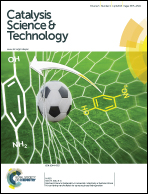The mechanism of the effect of H2O on the low temperature selective catalytic reduction of NO with NH3 over Mn–Fe spinel†
Abstract
H2O showed a notable inhibition on the low temperature selective catalytic reduction (SCR) reaction over Mn based catalysts. However, the mechanism of H2O effect was not clear. In this work, the mechanism of H2O effect on the low temperature SCR reaction over Mn–Fe spinel was studied using the transient reaction study and the steady-state kinetic analysis. According to the steady-state kinetic analysis, the reaction kinetic rate constants of NO reduction over Mn–Fe spinel (including the rate constants of N2 formation through the Eley–Rideal mechanism and the Langmuir–Hinshelwood mechanism, and the rate constants of N2O formation) in the presence of H2O and in the absence of H2O were compared. According to the transient reaction study, the effect of H2O on the elementary reactions of NO reduction over Mn–Fe spinel through both the Eley–Rideal mechanism and the Langmuir–Hinshelwood mechanism was investigated. The results indicated that the effect of H2O on the low temperature SCR reaction over Mn–Fe spinel was not only attributed to the competition adsorption of H2O with NH3 and NOx, but also related to the decrease in the oxidation ability and the inhibition of the interface reaction.


 Please wait while we load your content...
Please wait while we load your content...